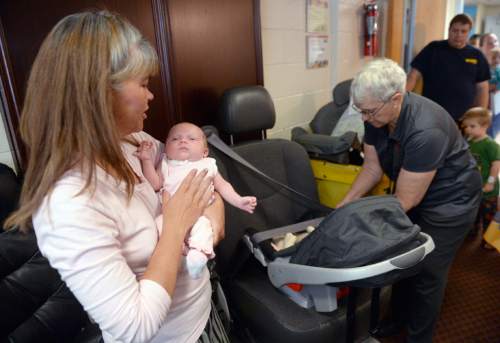This is an archived article that was published on sltrib.com in 2016, and information in the article may be outdated. It is provided only for personal research purposes and may not be reprinted.
Last year, the Utah Legislature outlawed job discrimination against women who are pregnant or breast-feeding. Now it is eying the next step: requiring employers to provide reasonable accommodations for those women.
A bill to do that, SB59, passed the Senate Business and Labor Committee on a 5-0 vote Tuesday, and now advances to the full Senate.
Sen. Todd Weiler, R-Woods Cross, told a standing-room-only hearing that "reasonable accommodations" have been defined through 25 years of case law after passage of the federal Americans with Disabilities Act.
"I would expect that in most cases, a reasonable accommodation would be either a reduced number of work hours — [such as] working six hours instead of eight," he said. "And/or maybe more breaks for going to the bathroom or expressing milk."
He said anything that requires major construction or major altering of the workplace would not be reasonable, and would not be required. The bill also would affect only businesses with at least 15 employees.
Marina Lowe, an attorney for the ACLU of Utah, said accommodations also can be "something as simple as having a stool or someplace to sit down if you have a job where you are on your feet frequently," or light-lifting duties, or a private place to express milk.
"If that proves to be unduly burdensome, then that's not reasonable," she said.
Lowe said the bill would provide clarity not available in other state and federal laws that deal at least partially with the issue. She adds that 16 other states have passed similar legislation.
"No Utah woman should have to choose between having a job and a family. This bill will ensure that impossible choice need not be made," Lowe said.
DelAnne Jessop-Haslam testified that she was forced to make that 'impossible choice' two years ago when she was pregnant with her now 20-month-old daughter, Preslee cq.
She said she worked at a title-insurance company, and her doctor suggested that she work reduced hours from home — which she felt would be possible. "But my employer told me that if he let me work at home for two hours less, then he would have to let everybody do that. I tried to explain he wouldn't."
She said because she could not reduce her hours, "I did end up getting sicker and took a one-month leave." She was not allowed to return to work, and was fired shortly before giving birth. She lost her insurance, is facing bankruptcy because of her medical costs and said it all contributed to a divorce.
Stephanie Pitcher, coordinator of the Utah Women's Coalition, said a survey by the National Partnership of Women and Families estimates that 250,000 women a year nationally are denied their requests for pregnancy accommodations, and that half of women surveyed did not request accommodation for fear of retaliation.
"And here in Utah most women work, 61 percent," she said.
Lowe said in states with pregnancy accommodation laws, "there has been a decrease in the number of pregnancy discrimination claims that are filed… There is also evidence that providing accommodations is good for business. It reduced employee turnover and absenteeism and boosts employee morale and productivity."
Weiler said most employers "are already complying with what we are proposing, but not all."
Lee Davidson



